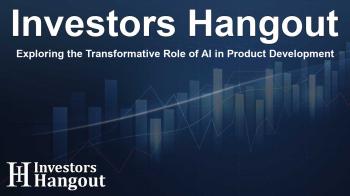Exploring the Transformative Role of AI in Product Development

Exploring the Transformative Role of AI in Product Development
Engineers are increasingly embracing the potential of Artificial Intelligence (AI) in product development while maintaining a level of caution as they assess its impact on various aspects of their work. This insightful perspective emerges from Avnet's latest survey, which highlights how engineers are navigating the evolving landscape of AI technology.
Survey Insights on AI Integration
The fourth annual Avnet Insights survey reveals that 75% of engineers feel optimistic about the market conditions for their design products, and nearly half—49%—believe that economic and market conditions will improve their design and development processes over the next year. Among the survey's findings, a significant segment of engineers, specifically 42%, reported already incorporating AI into their product design workflows, indicating a growing trend towards integrating these advanced technologies.
The Potential of AI Across Various Domains
Avnet's survey sought to understand where engineers perceive the most substantial opportunities for AI across 14 different areas, ranging from AI-driven simulations to hardware design and software code generation. Interestingly, engineers struggled to pinpoint a single area as the frontrunner for AI applications, which suggests that the transformative possibilities of AI are widespread, affecting multiple facets of product development.
According to Alex Iuorio, Senior Vice President of Global Supplier Development at Avnet, the challenge lies in mapping out a singular opportunity amidst the extensive capabilities of AI: "AI is poised to impact everything from design efficiency to collaborative processes. Its influence is broad, permeating all aspects of engineering work."
Key Functionality Enhancements Through AI
A staggering 96% of engineers concurred that AI is likely to influence essential product development functions significantly. These functions include enhancing automation in design tasks, facilitating personalized and customized designs, improving predictive market insights, and reducing product development cycles.
Navigating Challenges Associated with AI
While enthusiasm for AI is palpable, engineers also voiced concerns about the challenges posed by its integration. The survey identified security and privacy issues, highlighted by 37% of respondents, as a primary concern. Data quality problems (31%), high costs (24%), and integration difficulties with existing tools (25%) were also significant hurdles that engineers expect to face.
Iuorio emphasizes the importance of addressing these challenges effectively: "Every new frontier brings its own set of challenges. Engineers are rightly cautious, raising legitimate concerns regarding AI in product development. At Avnet, we leverage our long-standing experience to help navigate these challenges, merging supplier expertise with innovative customer insights to harness the vast opportunities available."
The Skills Engineers Need for AI Success
The Avnet survey also examined the skill sets engineers believe are critical for effectively utilizing AI in product design. Notably, the top skills identified include data analysis and interpretation, AI model optimization, and strong problem-solving abilities—each garnering a 16% response rate from engineers.
The survey results paint a picture of a vibrant technological landscape where engineers see the potential of AI not just as a tool, but as a transformative force in how products are designed and developed. With the commitment of companies like Avnet to support engineers through every challenge, the future of product development looks promising.
About Avnet
Avnet stands as a leader in global technology distribution and solutions, catering to evolving customer needs for over a century. The company supports clients at every stage of their product's lifecycle, from conception to prototype and production. Positioned within the technology value chain, Avnet accelerates design and supply processes, enabling its customers to generate revenue swiftly. Consistently, Avnet assists customers and suppliers worldwide in realizing the transformative possibilities that modern technology brings.
Frequently Asked Questions
What insights did the Avnet survey provide about AI?
The survey revealed engineers are optimistic about AI's impact on product design, with 42% already using it in their processes.
What challenges do engineers face with AI integration?
Security, privacy concerns, data quality, and high costs are primary challenges when integrating AI into product development.
What skills are necessary for engineers using AI?
Critical skills include data analysis, AI model optimization, and problem-solving capabilities.
How does AI enhance product development?
AI improves efficiency, automates tasks, supports personalized designs, and reduces time cycles for product development.
What is Avnet's role in AI adoption for engineers?
Avnet aims to support engineers by navigating challenges and leveraging its extensive experience to maximize AI's benefits in product design.
About Investors Hangout
Investors Hangout is a leading online stock forum for financial discussion and learning, offering a wide range of free tools and resources. It draws in traders of all levels, who exchange market knowledge, investigate trading tactics, and keep an eye on industry developments in real time. Featuring financial articles, stock message boards, quotes, charts, company profiles, and live news updates. Through cooperative learning and a wealth of informational resources, it helps users from novices creating their first portfolios to experts honing their techniques. Join Investors Hangout today: https://investorshangout.com/
Disclaimer: The content of this article is solely for general informational purposes only; it does not represent legal, financial, or investment advice. Investors Hangout does not offer financial advice; the author is not a licensed financial advisor. Consult a qualified advisor before making any financial or investment decisions based on this article. The author's interpretation of publicly available data shapes the opinions presented here; as a result, they should not be taken as advice to purchase, sell, or hold any securities mentioned or any other investments. The author does not guarantee the accuracy, completeness, or timeliness of any material, providing it "as is." Information and market conditions may change; past performance is not indicative of future outcomes. If any of the material offered here is inaccurate, please contact us for corrections.
